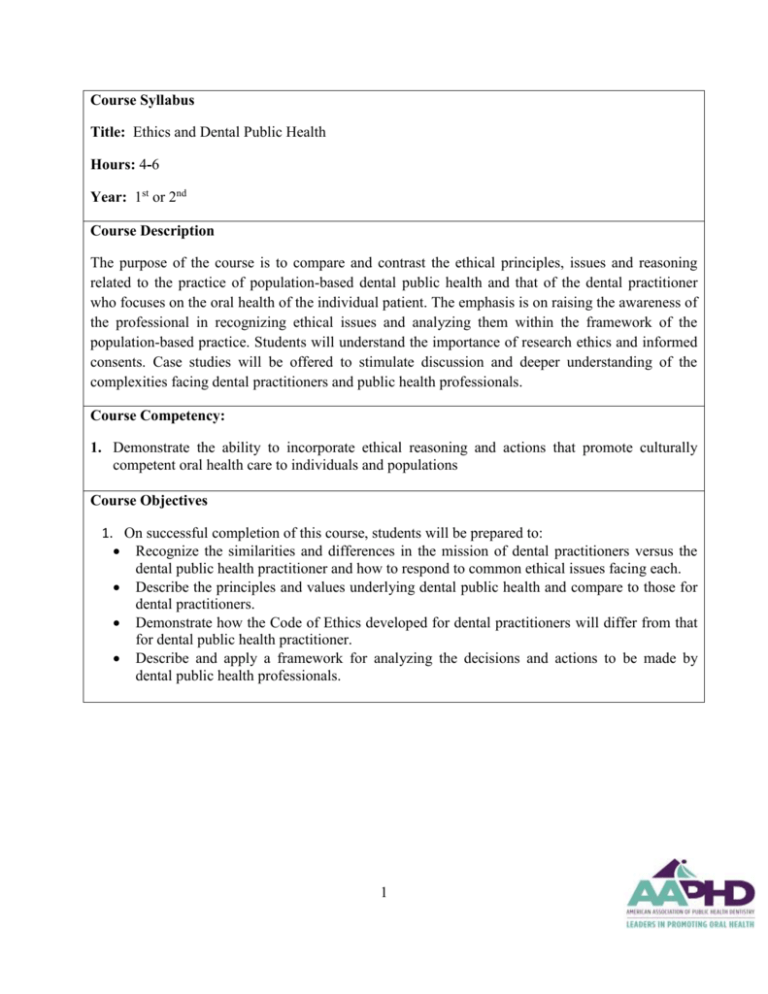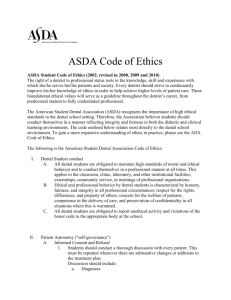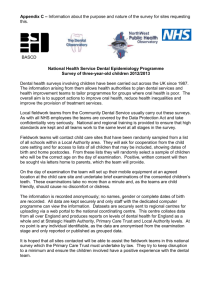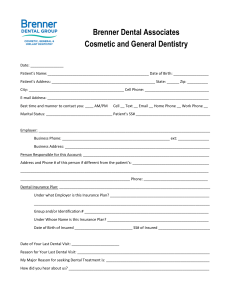Gostin LO., ed. Public Health Law and Ethics: A Reader, UC Press
advertisement

Course Syllabus Title: Ethics and Dental Public Health Hours: 4-6 Year: 1st or 2nd Course Description The purpose of the course is to compare and contrast the ethical principles, issues and reasoning related to the practice of population-based dental public health and that of the dental practitioner who focuses on the oral health of the individual patient. The emphasis is on raising the awareness of the professional in recognizing ethical issues and analyzing them within the framework of the population-based practice. Students will understand the importance of research ethics and informed consents. Case studies will be offered to stimulate discussion and deeper understanding of the complexities facing dental practitioners and public health professionals. Course Competency: 1. Demonstrate the ability to incorporate ethical reasoning and actions that promote culturally competent oral health care to individuals and populations Course Objectives 1. On successful completion of this course, students will be prepared to: Recognize the similarities and differences in the mission of dental practitioners versus the dental public health practitioner and how to respond to common ethical issues facing each. Describe the principles and values underlying dental public health and compare to those for dental practitioners. Demonstrate how the Code of Ethics developed for dental practitioners will differ from that for dental public health practitioner. Describe and apply a framework for analyzing the decisions and actions to be made by dental public health professionals. 1 Course Contents Mission for Dental Public Health and Dental Practitioners Principles and Values for Dental and Public Health Practitioners Professionalism: Practicing within a code of ethics Decision-making in Dental Public Health Ethics: A framework for evaluating an ethical issue Examining the ethical issues related to community oral health promotion and disease prevention. Course Assessment of Students' Achievement of Course Objectives Students' attainment of course objectives will be assessed by three methods: (1) a written assessment of a case scenarios depicting a dental public health ethical issue (which could be the elder abuse case or the vending machine rules in schools); and (2) student participation in the classroom discussions. Course Readings American Dental Association. ADA Principles of Ethics and Code of Professional Conduct, Chicago:2011. American Student Dental Association. White Paper on Ethics & Professionalism in Dental Education. Chicago: 2009. http://www.asdanet.org/uploadedFiles/The_Issues/ASDA%20White%20Paper%20FinalNewcomb.pdf Bates MN., et al. “Health effects of dental amalgam exposure: a retrospective cohort study.” Int. J. Epidemiol. (2004) 33 (4): 894-902. doi: 10.1093/ije/dyh164. First published online: May 20, 2004. http://ije.oxfordjournals.org/content/33/4/894.full.pdf+html. Childress JF, et al. “Public Health Ethics: Mapping the Terrain.” J Law, Med & Ethics, (2002) 30:169-177. http://www2a.cdc.gov/phlp/docs/CDC.Childress.web.pdf Friedman JW, Atchison KA. The Standard of Care: An Ethical Responsibility of Public Health Dentistry. J of Pub Hlth Dent, (1993) 53(3): 165-169. http://onlinelibrary.wiley.com/doi/10.1111/j.1752-7325.1993.tb02696.x/pdf Gostin LO., ed. Public Health Law and Ethics: A Reader, UC Press, 2010. 2 Gostin LO, Powers M. “What Does Social Justice Require for the Public’s Health? Public Health Ethics and Policy Imperatives.” Health Affairs, (2006) 25(4): 1053-1060. http://content.healthaffairs.org/content/25/4/1053.full.pdf+html The Journal of Law, Medicine & Ethics. (2002) 30 (2). First published online Jan 24, 2007. http://onlinelibrary.wiley.com/doi/10.1111/jlme.2002.30.issue-2/issuetoc. Kass NE. “An Ethics Framework for Public Health.” Am J Public Health. 2001; 91:1776–1782. Krasse B. The Vipeholm Dental Caries Study: Recollections and reflections 50 years later. J Dent Res 2001; 80: 1785-1788. Needleman HL. “Orofacial trauma in child abuse: types, prevalence, management, and the dental profession’s involvement.” Ped Dent, (1986) 8(1): 71-80. http://www.aapd.org/upload/articles/Needleman-08-S1.pdf The New York Times, articles about Flouride: http://topics.nytimes.com/topics/news/health/diseasesconditionsandhealthtopics/fluorides/index.html North Carolina Institute for Public Health, Gillings School of Global Public Health: http://oce.sph.unc.edu/phethics/. Tilden VP, Schmidt TA, Limandri BJ, Chiodo GT, Garland MJ, Loveless PA. “Factors that influence clinicians' assessment and management of family violence.” Am J Public Health, (1994) 84(4): 628-633. doi: 10.2105/AJPH.84.4.628. http://www.ncbi.nlm.nih.gov/pmc/articles/PMC1614797/pdf/amjph00455-0102.pdf U.S. Department of Health and Human Services. Healthy People.gov: Oral Health Community Interventions. http://healthypeople.gov/2020/topicsobjectives2020/ebr.aspx?topicId=32 3





